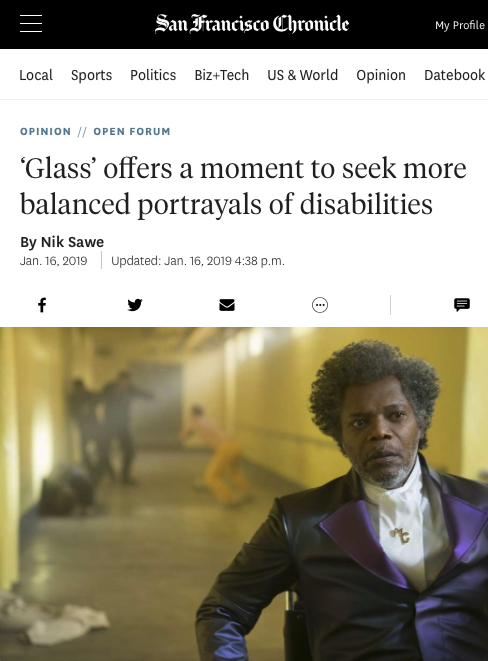
San Francisco Chronicle OpEd
A Call for Fair Representation of Disabilities in the Media — January 2019
Author Nik Sawe writes an open OpEd (Opinion Editorial) in the San Francisco Chronicle regarding how disability is portrayed in the media, creating a catch-22: do we be happy we’re on the screen at all? or do we demand more fair treatment on-screen? [Article contains nothing clearly requiring warning, but does mention injuries in childhood with no detail, adversity in the community with mobility issues, stigmatization, etc.]
Nik, similarly to the character Mr. Glass in Shyamalan’s latest film (Glass) has osteogenesis imperfecta — a rare brittle-bone condition. And having the light shone on this rare disorder is — well — rare. So for a brief moment, we folk with dissociative identity disorder (DID) may have a chance to educate Hollywood and the public together with persons with physical disabilities about how to help get more fair and accurate representations in the media. A rare chance for an alliance because we frankly need our voices boosted when we try to speak up by having others join us when we protest, petition, or try to make demands to advocate for better treatment or more accurate representations.
Would we be better off with no depictions of DID or plurality in theaters if the only ones on the screen were of the too-common Jekyll-Hyde trope? Do we say, “Hey, Nik, do people ask whether you sabotage trains?” Because that’s the type of treatment people with DID get when a movie like Glass comes out: “Do you have a monster in there? Are you going to hurt me?” Not from random people; from our best friends, our siblings, our family, etc. The people one would think know you better than that, no matter how many of you there are.
So do we reach out across the disability aisle and start to talk about cross-disability awareness in the media, team up with folks with a variety of issues, and try to come together to protest, to write letters, sign petitions, to advocate for each other, to help signal boost each other — and learn about each other? Sometimes the worst stigmatization comes from within the disability community, and often even from people with the same disorder.
What do you say we should do? Reach out? Or just stay in our cubby? Why?
Please be sure to see and respond to our comments on the San Francisco Chronicle article as well.
